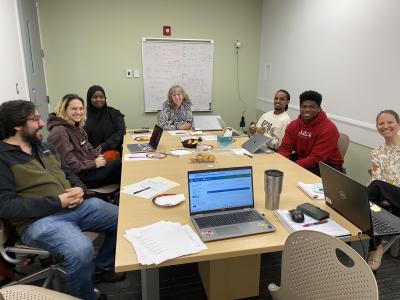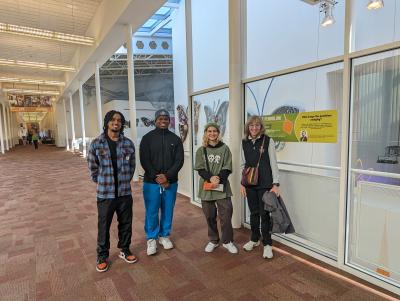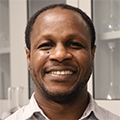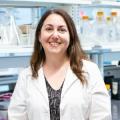MOLECULES TO SOCIETY
What is MARC T34 at OSU?
This is Ohio State’s first T34 grant for Maximizing Access to Research Careers (MARC) funded by the National Institutes of Health (NIH). The mission of our "Molecules to Society" MARC T34 at Ohio State is to increase diversity in the next generation of biomedical scholars doing impactful research. This will be accomplished by providing undergraduate students with a research-focused training program that includes courses, experiential learning, faculty and graduate student mentoring, and peer-support.
- Training for future biomedical, research focused advanced degrees (PhD or MD/PhD).
- Experiential learning, mentoring, & peer support.
- Training in research methods.
- Preparation for graduate school success.
- Scholarship: Tuition support and stipend.
Timeline for 2024-2025
Application deadline - February 15, 2024.
- Sophomore in SP2024.
- Engineering, chemistry, public health, biomedical sciences, or STEM majors.
- Minimum GPA 3.0.
- Research-oriented and interested in research-focused higher degree program (PhD or MD/PhD).
- Must be a citizen or a noncitizen national of the United States or have been lawfully admitted for permanent residence at the time of appointment.
- Previous research experience is not required.
- Research advisor is not required. MARC scholars will be guided in their selection of research mentors.
Application requirements
1) A statement of your interest in being a MARC scholar. This statement should be 1.5 pages (11 pt font, 1-inch margins, single space) and written in your own words (that is, no AI or other materials you find on the internet). Be sure to address the following:
- Why did you select your major? What are your future career goals?
- Given what you know about the MARC T34 program, how do you feel you will personally benefit from participating in the program throughout your academic career?
- How do your experiences align with the mission of the MARC T34 program?
- What barriers do you think could affect your career trajectory, and what training and support do you need to help overcome them?
2) Advising report: Unofficial transcript.
3) Resume or curriculum vitae (CV).
4) Two letters of recommendation. Please arrange for two letters of recommendation, at least one of which must be from an Ohio State faculty member, to be submitted directly to marc@osu.edu with the subject title “Recommendation for Last name, First name” (e.g., Recommendation for Smith, Jane). Letter should be a PDF file named “Last name student_last name referee.pdf” (e.g., Smith_Johnson.pdf).
Deadline is February 15, 2024.
Scholars
Kieara Mercado
Idris Hakeem
Emanuel Tewolde
Alexa Plotkin
Activities
Our first meeting!

Visiting COSI!

MARC T34 at OSU Mentors
MARC scholars will participate in research and training activities guided by one or more of the 29 diverse faculty mentors listed below.


Olorunfemi Adetona - Environmental Health Sciences
Research summary: Combustion emissions are a major contributor to air pollution and induce adverse respiratory and systemic outcomes. Leveraging unique human exposure scenarios, research in our lab seeks to understand the biological mechanisms involved in the contributions of exposures to combustion-derived air pollutants to the development of disease and investigate approaches to control such exposure or mitigate their adverse health impacts. As an example, we conduct epidemiological studies among wildland and structural firefighters to determine the adverse health outcomes of their occupational exposure to smoke independently or in combination (interactively) with other risk factors.
MARC T34 research project: Students will investigate the longitudinal profile of respiratory health among wildland firefighters in association with their occupational exposure to smoke as indicated by changes in their lung function and their epigenome and transcriptome in the nasal epithelium.
Availability: Accepting students for AU2023/SP2024 cycle; will accept student in AU2024/SP2025 if no student in AU2023/SP2024.

Gunjan Agarwal - Mechanical and Aerospace Engineering
Research summary: Collagen is the most abundant extracellular matrix protein in the human body. Different types of collagen can form supramolecular assemblies like fibrils or networks. Understanding how cells and matrix proteins interact with collagen and affect these supramolecular assemblies is important for health and disease. Our research seeks to understand how the widely expressed cell surface receptors (integrins and discoidin domain receptors) interact with collagen types I and IV. Towards this goal we employ high-resolution, single molecule imaging techniques like the atomic force microscopy (AFM) to analyze the binding patterns of recombinant proteins on purified samples.
MARC T34 research project: Students will learn how to use the AFM to examine collagen samples with and without recombinant proteins. They will also learn how to quantify the results by employing image analysis and statistical tools.
Availability: Accepting students for AU2023/SP2024 cycle.

Robert A. Baiocchi - Comprehensive Cancer Center
Research summary:
MARC T34 research project:
Availability:

Christin Burd - Molecular Genetics, Cancer Biology and Genetics
Research summary: My lab is interested in identifying genetic and environmental mechanisms that contribute to cancer and aging. We use a combination of molecular biology, biochemistry, cell culture, mouse models and human tissue samples to study melanoma formation and age-related declines in immune function. Our goal is to block these processes to promote healthy aging and aid in the prevention, detection and treatment of melanoma.
MARC T34 research project: Students will investigate how cellular signaling pathways contribute to T cell aging or melanoma formation.
Availability: Accepting students for AU2023/SP2024 cycle.

Carlos Castro - Mechanical and Aerospace Engineering
Research summary: Our laboratory seeks to advance DNA nanotechnology design and fabrication methods and to develop DNA nanodevices for biological applications. A major focus of our group is to develop DNA-based measurement devices to probe biophysical properties of molecules and molecular complexes. We have collaborated with Profs. Michael Poirier and Ralf Bundschuh to apply these tools to study the structure and conformational dynamics of chromosome subunits. We are also collaborating with Prof. Jonathon Song to implement DNA devices to engineer cell membranes, for example to allow fluorescence-based sensing of molecules or forces in the cell microenvironment. Another key focus of our lab is enhancing the function of biomolecular devices by developing hybrid structures that integrate DNA structures with nanoparticles (e.g., gold nanoparticles for photoresponsive devices, collaboration with Prof. Jessica Winter) or proteins (e.g., protein force sensors, collaboration with Prof. Marcos Sotomayor).
MARC T34 research project: The project will focus on folding and higher order assembly of a reconfigurable DNA origami nanostructures with the aim of constructing assemblies that interface with synthetic cell membranes.
Availability: Accepting students for AU2023/SP2024 cycle.

Jeffrey Chalmers - Chemical and Biomolecular Engineering
Research summary: The identification/characterization, isolation/separation of biological cells is fundamental to basic biological studies to crucial clinical, human tests. Our bioengineering lab, in general, focuses on the development and optimization of cell characterization and separation technology. However, while we focus on the development of technology, when we are successful, in many cases we obtain experimental results which question more basic biological processes. For example, we are currently developing magnetic technology to further quantify/characterize red blood cells from patient with sickle cell disease as well as technology to separate the sickle cell red blood cells from normal cells to reduce the need for donor transfusion blood units. Actual projects range from application of magnetic relationships, to computer simulations, to advance technique to characterize proteins and other constituents in the sickle cell RBCs. We also study the effect that hydrodynamic forces have on cells.
MARC T34 research project: Students project span the range of cell isolation/characterization of cells and separation technology.
Availability: Accepting students for AU2023/SP2024 cycle.

Zobeida Cruz-Monserrate - Internal Medicine
Research summary: My laboratory research program is focused on studying pancreatic diseases. The long-term goals of my research laboratory are to develop novel strategies for the detection, prevention and treatment of pancreatic ductal adenocarcinoma (PDAC) and pancreatitis via uncovering unique mechanisms related to the initiation of these diseases. Towards this goal we have shown that the molecule integrin alpha6beta4, the enzyme Cathepsin E (CTSE), and pH-sensitive imaging probes are all early biomarkers of PDAC development. We have been engaged in the development of novel imaging probes that have the potential to detect and treat pancreas containing early lesions of PDAC using the enzymatic activity of CTSE using pre-clinical mouse models. This technology applies to any other diseases that express CTSE at high levels which is the case of pancreatic cancer. We are also interested in the prevention of obesity-associated tumor development. Obesity has been associated with an increased risk of cancer development, in particular PDAC. Obesity rates in adults and children have also skyrocketed during the past 2 decades. Therefore, it is critical that we begin to understand the molecular mechanisms of how obesity promotes cancer development. In an effort to discover alternative methods of studying obesity and its relationship to PDAC development, we use a mouse model of obesity-associated PDAC to study some of the mechanisms that link obesity and PDAC.
MARC T34 research project: Students will investigate the role of obesity in pancreatic diseases.
Availability: Accepting students for AU2023/SP2024 and AU2024/SP2025 cycle.

Ashley Felix - Epidemiology
Research summary: My research focuses on racial and ethnic disparities that occur along the gynecologic cancer control continuum, including etiology/prevention, early detection, diagnosis, treatment, and cancer survivorship. In my work I use a combination of existing data sources and primary data collected by my research team to answer questions that pertain to multiple facets of endometrial cancer epidemiology. Current funded work includes understanding determinants of disparities in receipt of guideline-concordant treatment, racial differences in effects of weight loss on intermediate cancer biomarkers, and the patient-reported experience following a cancer diagnosis.
MARC T34 research project: Students will support investigations related to racial disparities in gynecologic cancers.
Availability: Accepting students for AU2023/SP2024 cycle.

Amy Ferketich - Epidemiology
Research summary: My research involves delivering and evaluating smoking cessation interventions and examining policy approaches to addressing tobacco use. With respect to smoking cessation, my research has involved delivering cessation services to Medicaid-enrolled individuals in Appalachian primary care clinics, individuals with serious mental illness, and those living with HIV. My other work includes examining tobacco use patterns and influences among youth and young adults, with a focus on novel tobacco products. This work falls under the umbrella of tobacco regulatory science.
MARC T34 research project: Students will examine tobacco and other substance use among youth and young adults.
Availability: Accepting students for AU2023/SP2024 cycle.

Aharon G. Freud - Comprehensive Cancer Center
Research summary: Research in my lab focuses on understanding how one type of white blood cell of the immune system, the natural killer (NK) cell, is produced in the body. We use sophisticated in vitro and in vivo experimental tools and approaches to investigate how NK cells are made in healthy human tissues from uncommitted hematopoietic progenitor cells and how NK cell production and functions are impacted in the setting of cancer.
MARC T34 research project: Students will learn how to isolate hematopoietic progenitor cells from human tissues and then culture these in vitro to produce mature NK cells. This technique will be utilized to address current unknowns in our understanding of how NK cell production is regulated in the body.
Availability: Accepting students for AU2023/SP2024 cycle.

Venkat Gopalan - Chemistry and Biochemistry
Research summary: Salmonella enterica subspecies enterica serovar Typhimurium is a food-borne pathogen that causes gastroenteritis. There are no drugs or vaccines available to combat Salmonella. As part of a multi-investigator project led by Prof. Brian Ahmer (Microbial Infection & Immunity, OSU), we are exploring sugar-phosphate toxicities as an intrinsic vulnerability that could be leveraged for drug discovery.
MARC T34 research project: Students will support investigations of potential inhibitors of select target enzymes in Salmonella.
Availability: Accepting students for AU2023/SP2024 cycle.

John Gunn - Pediatrics and Center for Microbial Pathogenesis
Research Summary: Dr. Gunn’s laboratory primarily studies Salmonella (gastroenteritis; typhoid fever) pathogenesis. The research is particularly focused on bacterial biofilms and small molecule therapeutics. These approaches are studied in the context of acute and chronic infections where they investigate the contribution of gene regulation and biofilm formation on pathogenesis, immune system recognition, and survival within host cells. The Gunn lab developed a mouse model for chronic Salmonella infection of the gallbladder and uses this model to study both host and microbial factors that are responsible for establishing and maintaining asymptomatic, persistent infection of this organ. Additionally, the laboratory is developing new vaccine and therapeutic approaches to counteract Salmonella infections, as well as the effectiveness of these approaches on other bacterial pathogens. Major current projects include:
a. Bacterial targets and in vivo/in vitro effectiveness of identified anti-biofilm compounds/antibodies
b. Experimental therapeutics directed toward Salmonella intracellular survival
c. Gallbladder microbiome and immune response during chronic carriage
d. Typhoid fever epidemiology and phenotypic characterization of clinical isolates
MARC T34 research project: Students will investigate aspects of the major projects listed above.
Availability: Accepting students for AU2023/SP2024 or AU2024/SP2025 cycle.

Darryl B. Hood - Environmental Health Sciences
Research summary: Darryl B. Hood, Ph.D. is a Professor, Deans’ Fellow, and Environmental Public Health Neurotoxicologist in the Division of Environmental Health Sciences in the College of Public Health at The Ohio State University. Dr. Hood is the co-architect of the novel Public Health Exposome framework and a Big Data to Knowledge analytic tool chain that uses an environmental justice lens. His work is focused in the high-risk and vulnerable underrepresented minority census tracts of Columbus, OH. Students working with Dr. Hood will be out in the community at one of 4 locations of a federally qualified health center, Primary One Health, or St Vincent Family Center, or Columbus Early Learning Center, or the African American African Studies-Community Extension Center performing community engaged research. currently serves as a member of the National Advisory Environmental Health Sciences Council at the National Institute of Environmental Health Sciences. He also serves as a member of the Children’s Environmental Health Committee and Standing Committee on Emerging Science for Environmental Health Decisions at the National Academies of Science, Engineering, and Medicine.
MARC T34 research project: Students will investigate the links and associations of the built, natural, physical and social environment with disparate health outcomes in environmental justice communities using a Public Health Exposome framework.
Availability: Accepting students for AU2024/SP2025 cycle.

Jane Jackman - Chemistry and Biochemistry
Research summary: All organisms require small RNA molecules called transfer RNA, or tRNA, to carry out protein synthesis, but more recently, many roles for tRNA molecules outside of protein translation have been identified. In the Jackman lab, we study several highly conserved enzymes that catalyze tRNA processing and modification reactions required for cells to generate functional tRNA, including enzymes that have been implicated in human disease but whose biological impact is not fully understood. We utilize enzymology, RNA biochemistry and model organism genetics to study the molecular mechanisms and biological functions of these critical enzymes in a diverse array of organisms from yeast to vertebrates.
MARC T34 research project: Students will investigate the molecular mechanisms and biological specificities of essential tRNA modification and processing enzymes
Availability: Accepting students for AU2023/SP2024 cycle.

Jesse Kwiek - Microbiology
Research summary: The Kwiek lab uses the tools of virology, epidemiology, and pharmacology to better understand viral pathogenesis and the public health impact of infectious diseases. Working bench-to-bedside, we seek to understand the contributions of de novo fatty acid biosynthesis to host pathogenesis, and using our novel fatty acid synthase inhibitor (Fasnall), we endeavor to develop a pan-antiviral therapeutic. Moving from bedside-to-bench, we assay tissues and viruses isolated from participants in observational studies, we test hypotheses using primary cell and tissue culture models of viral pathogenesis, and we create biochemical tools to understand how viruses exploit host processes.
MARC T34 research project:
Availability: Accepting students for AU2024/SP2025 cycle.

Jiyoung Lee - Environmental Health Sciences
Research summary: My research focuses on pathogen exposures, transmission pathways, and health outcomes, especially gut microbiome, and other acute and chronic outcomes. The microbes we have been working on include enteric pathogens and cyanobacteria that make cyanotoxins, causing liver and neurodegenerative diseases. Our Environmental Microbiology and One Health Lab (EMOHL) has focused on One Health & One Water paradigm for solving the pathogen and antibiotic resistance problems. My lab uses interdisciplinary approaches, including microbial source tracking, metagenomics, epidemiology, and geospatial tools.
MARC T34 research project: Students will investigate the effects of cyanotoxin exposure on health effects and intervention methods.
Availability: Accepting students for AU2023/SP2024 cycle.

Tom Magliery - Chemistry and Biochemistry
Research summary: The Magliery lab uses high-throughput and statistical approaches to understand the basis of protein stability, and we apply our methods to engineer proteins as therapeutics and diagnostics. On the protein folding side, we develop screens and selections to sort libraries (collection) of mutants for activity, and we have developed high-throughput methods for measuring the thermodynamic stabilities of variants from these screens. Our main focus has been on model proteins such as the four-helix bundle Rop, the irregular helical DNA binding domain of FruR/Cra, and the mostly beta sheet B1 domain of protein G. We also study the physical meaning of correlated occurrences of amino acids in protein families, and in particular we have develop approaches to stabilize proteins from statistical prediction. We have mostly studies metabolic enzymes such as triosephosphate isomerase, superoxide dismutase, and adenylate kinase using this approach. We have applied our methods to engineering proteins and protein fragments for medical use, mostly in cancer. Targets have include antibody fragments against sialyl-Tn and nucleolin, fragments of Notch ligands, and the enzyme paraoxoase-1.
MARC T34 research project: Two possible project areas include protein expression, purification and structural studies of protein variants from our high-throughput experimental approaches, as well as protein expression, purification and functional studies of engineered antibody fragments.
Availability: Accepting students for AU2023/SP2024 cycle and AU2024/SP2025 cycle.

Darren M. Mays - Comprehensive Cancer Center
Research summary: Many cases of cancer are preventable by modifying risk behaviors that initiate early in life, accelerate in young adulthood, and become established in adults. Our research focuses on developing and testing innovative interventions, ranging from digital health communication strategies to policy change, to prevent and reduce cancer risk behaviors, such as tobacco use. We use biobehavioral frameworks and methods to develop and test interventions, and we conduct experimental studies and clinical trials to evaluate their effects.
MARC T34 research project: Students will be involved in research studying the tobacco retail sales environment, and studies examining people’s beliefs about tobacco products and how these are influenced by tobacco marketing and packaging.
Availability: Accepting students for AU2023/SP2024 cycle.

Julianna Nemeth - Health Behavior and Health Promotion
Research summary: Brain injury (BI) from violence is an under-recognized public health crisis disproportionately impacting all NIH-designated U.S. health disparity populations. My research has demonstrated that not only are BIs from repeated head trauma and strangulation common among service seeking domestic violence (DV) survivors and youth and young adults experiencing homelessness (YYEH), but they are going unrecognized by survivors and providers alike. Executive function dys-regulation, a common symptom of BI, can impact a person’s ability to control emotion, remember, make plans, initiate tasks, and follow through—critical skills necessary to engage safety, health, and social services and to make behavior change. Through participatory action research, we created and evaluated CARE (Connect, Acknowledge, Respond, Evaluate)—the first BI-aware approach to trauma-informed care (TIC). CARE improves TIC practices agency-wide, and to address not only head trauma, strangulation, and resulting BIs, but also to address mental health, substance use, and suicide ideation, because staff feel empowered to recognize, address and accommodate BIs in services.
MARC T34 research project: Students will work on a community-partnered research project to adopt or expand CARE in organizational practice: 1) The Ohio Domestic Violence Network is working to increase healthcare access through the use of CARE mobile advocacy; 2) the Franklin County courts are conducting a needs assessment in order to target CARE for use in victim services and probation; and 3) we are currently working to understand how BIs, and resultant executive function challenges, are impacting YYEH’s ability to access and engage tobacco cessation and social services.
Availability: Accepting students for AU2023/SP2024 cycle or AU2024/SP2025 cycle.

Steve Oghumu - Pathology
Research Summary: Dr. Oghumu’s research program is aimed at understanding the genetic and immunological factors underlying the etiology and pathogenesis of human disease. His research is focused on two primary disease areas: (i) oral carcinogenesis and (ii) substance use disorder. Using innovative mouse models, he is investigating the cellular, molecular and immunological mechanisms of oral carcinogenesis and advancing the development and application of compounds for oral cancer chemoprevention and treatment. He is also developing and applying uniquely novel mouse models to determine the contribution of X-chromosome inactivation to sex differences in susceptibility to neoplastic and neurologic disorders.
MARC T34 research project: Students will investigate the mechanisms of (1) oral cancer development or (2) sex differences in susceptibility to disease.
Availability: Accepting students for AU2023/SP2024 cycle and AU2024/SP2025 cycle.

Tasleem Padamsee - Health Services Management and Policy
Research summary: The Daughter Sister Mother Project conducts both qualitative and quantitative studies of how individuals at high risk of breast cancer learn about risk and undertake risk-management activity. Our research incorporates psychological, interpersonal, social, and structural elements of risk-related decision making, and often focuses on racial, ethnic, and socioeconomic disparities in access to information, support, and medical interventions related to breast cancer risk. Currently, we are working on (a) analyzing original survey data from high-risk Black and white women in the US, (b) designing and testing a patient-facing intervention to connect women newly aware of their breast cancer risk to the support of a patient navigator, and (c) extending our research to study the specific experiences of Latinas, Asian American, and Native American women, as well as transgender and nonbinary individuals.
MARC T34 research project: Students will contribute to one or more specific studies underway at the time of their appointment; more information will be available Spring 2024.
Availability: Accepting students for AU2024/SP2025 cycle.

Electra D. Paskett - Epidemiology
Research summary: While many national surveys include representative samples of white and African-American urban individuals, fewer include samples from rural, Appalachian and other unique populations such as Somali or Amish. The Hispanic population of Ohio is made up of immigrants from many countries, thus creating opportunities for exploring the influence of country and culture. This project will provide an opportunity to better understand and describe these under-represented populations in order to plan future cancer research to address specific issues identified. It would also enable us to implement strategies to address barriers to the receipt of adequate cancer prevention, screening and treatment modalities, including access to clinical cancer trials. Thus, this supplement/project will inform research across the OSUCCC research programs as well as contribute new knowledge to national surveys about cancer prevention attitudes, behaviors, and communication patterns.
MARC T34 research project: Students will study the factors that influences the health of Ohio residents including: behaviors, access to care, individual beliefs, cancer risk and screening, etc.
Availability: Accepting students for the AU2023/SP2024 and AU2024/SP2025 cycles.

Shaurya Prakash - Mechanical and Aerospace Engineering
Research summary: Fundamental biological transport of materials, nutrients, biomolecules, and fluids occurs at the molecular length scales. Our research focuses on designing, fabricating, and developing new devices and tools that allow a better understanding of these transport processes to address problems in cancer, infectious disease, wound healing, and cardiovascular health. We use multidisciplinary approaches to engineer and characterize new devices that reveal discoveries to impact healthcare.
MARC T34 research project: Students will design, fabricate, and test new devices to address problems in wound healing, infectious disease, and cancer.
Availability: Accepting students for AU2023/SP2024 cycle.

Megan E. Roberts - Health Behavior and Health Promotion
Research summary: Tobacco is the leading cause of preventable death both in the United States and globally. It is also a major contributor to health disparities. My research focuses on tobacco use among populations historically targeted by the tobacco industry—particularly, adolescents and young adults, racial/ethnic minorities, and individuals living in rural areas. I use methods like online surveys and smartphone (app-based) data collection to learn about how and why people use tobacco products. I also conduct surveillance of the tobacco retail environment to learn more about how and where tobacco is being sold. Most of this work is designed to directly inform how local and national governments regulate tobacco.
MARC T34 research project:
Availability: Accepting students for AU2023/SP2024 cycle and AU2024/SP2025 cycle.

Min-Ae Song - Environmental Health Sciences
Research Summary: Menthol cigarette smoking is disproportionately prevalent among African Americans (AAs, ~80% vs ~39% general population), mainly due to the tobacco industry’s predatory marketing in AA communities. Our research investigates AA menthol smokers’ reaction to a menthol ban and their access to cessation resources and assesses potential health-risk reductions when menthol cigarettes are removed from the market. This question is key to health equity. Regarding health risk reductions, we utilize innovative biomarkers of effect using biological aging and chemical exposure.
MARC T34 research project: Students will work closely with OSU Center For Cancer Health Equity and OSU Center for Tobacco Research to conduct the described menthol ban research, gain molecular epidemiology experience, and contribute to manuscript writing.
Availability: Accepting students for AU2023/SP2024 and AU2024/SP2025.

Jonathan Song - Mechanical and Aerospace Engineering
Research summary: We employ microfabricated tissue-engineered strategies to understand the physical and chemical interactions of tumor and vascular cells governed by extracellular matrix mechanics, vascular perfusion, and interstitial transport.
MARC T34 research project: Students will design and fabricate microtissue engineered models for monitoring and manipulating cells under extrinsically applied biochemical and biophysical cues.
Availability: Accepting students for AU2023/SP2024 cycle.

Katelyn Swindle-Reilly – Biomedical Engineering, Chemical and Biomolecular Engineering
Research summary: Our laboratory seeks to use polymeric biomaterials as tools to improve human health. In particular, our lab investigates the design of polymeric systems to use as prosthetics and drug delivery systems. We focus on new treatments that target oxidative stress and inflammation, which is associated with many age-related and traumatic conditions. The primary focus of the lab is to solve problems related to vision-threatening diseases. Other collaborative applications include cancer, women’s health, neuroscience, and wound healing.
MARC T34 research project: Students will learn and use techniques relating to polymer synthesis, biomaterial characterization, cell culture, and/or biochemical/drug release assays to work on one of the applications under investigation in the lab.
Availability: Accepting students for AU2024/SP2025 cycle.

Willi L. Tarver - Comprehensive Cancer Center
Research summary: My lab focuses on cancer health informatics, or the use of health information technology (HIT) in the context of cancer care. The long-term goal of my research is to understand the potential for HIT to improve cancer care and health equity. In addition, I develop technologies designed to improve underserved populations’ access to health information and cancer care. My work also has a special emphasis on tailoring these technologies to populations of interest in order to improve their uptake and effectiveness.
MARC T34 research project: Students will support investigations related to the use of HIT among underserved populations.
Availability: Accepting students for AU2023/SP2024 cycle.

Claudia Turro - Chemistry and Biochemistry
Research summary: The Turro group is interested in understanding and utilizing reactions of metal complexes that can be initiated with light. The potential applications of these reactions span the areas of photochemotherapy (PCT) and photodynamic therapy (PDT) for the treatment various diseases, as well as luminescent imaging agents and sensors. Transition metal complexes that are nontoxic in the dark and become highly toxic upon irradiation with visible or near-IR light are ideal for PCT and PDT. Complexes that undergo photo-induced ligand dissociation for PCT are under investigation, such that the complex can deliver drugs or inhibitors that selectively target tumors, while simultaneously producing reactive oxygen species for PDT to induce cancer cell death.
MARC T34 research project: Students will be involved in the synthesis and characterization of new metal complexes for drug delivery and will learn to measure their excited state properties using a number of spectroscopic methods. The compounds will then be tested by collaborators to determine their activity towards cancer cell lines.
Availability: Accepting students for AU2023/SP2024 cycle; will accept student in AU2024/SP2025 if no student in AU2023/SP2024.
